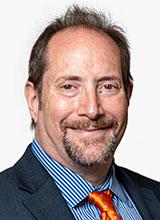Date Posted

Coming on board as the Division of Cancer Prevention (DCP) Director in July 2020 was a unique challenge. COVID is a serious problem now, but we have faith in science that it will be solved soon. While cancer is not necessarily at the forefront of people’s minds during a devastating pandemic, cancer continues to kill millions yearly. Those who are at risk for cancer rely on us to continue innovating and striving to prevent both cancer and the inequities that accompany it.
To be here today as the leader for DCP is, far and away, the greatest honor and privilege of my career. It is very much a homecoming for me. If you don’t already know, I trained as a Cancer Prevention Fellow from 1999 to 2002 and then worked in the Division of Cancer Epidemiology and Genetics until I left the NCI in the beginning of 2011. I had the great opportunity to serve on the faculty of Albert Einstein College of Medicine/Montefiore Medical Center in the Bronx, NY, which has one of the poorest urban populations in the US. I am both an outsider and an insider, and I hope to bring the best of those experiences to my new role.
When this position was first announced, I didn’t immediately consider applying. As I thought about it more, I got really excited by the prospect of the position. What could we do to prevent cancer and improve lives? How can we apply what has been learned over the last 20 years to really make an impact on cancer nationally and internationally? This is a once-in-a-lifetime opportunity to work with you to make a lasting impact in public health by preventing cancer and saving lives.
We have a tremendous opportunity to prevent suffering and death from cancer. A foundation of DCP is what I call the DCP research and development pipeline: discovery, translation, early validation, and validation/efficacy. Building off of all that you have accomplished, we will accelerate and expand our programs, and make sure efforts make their way into clinical trials and out into the world. We must also continue to address the greater needs for cancer prevention, especially in those in our populations who are unduly burdened at home and abroad. Improving health equity can be achieved through the development of innovative inventions, interventions, and approaches to prevention. DCP sponsors and directs groundbreaking, rigorous, collaborative research to revolutionize and accelerate prevention of cancer and its consequences for all people.
The science of prevention is transdisciplinary. We will consider and solve the challenges of cancer prevention by incorporating many viewpoints: genetics, microbiology, clinical science, epidemiology, statistics, engineering, psychology, anthropology, sociology, biomedical informatics, and other disciplines. We will use every tool in our tool kit to reduce the burden of cancer. We will work even more closely with our colleagues to identify and translate the best basic scientific discoveries into novel preventive interventions that, if validated, we can then hand-off to and work with other scientists to test their effectiveness at scale and deliver these interventions to those who would benefit the most from them.
Prevention, especially cancer prevention, presents unique challenges. We need to demonstrate the absence of relatively rare events (cancer) in a generally healthy population—small signal/big noise. For example, we know that if we did nothing to prevent cervical cancer, about 1 of 50 women will get cervical cancer over a lifetime. That is, 49 out of 50 would be perfectly fine if we left them alone. In many ways, “do no harm” is more important in public health than it is in medicine. Because of that, we will promote the development and validation of novel prevention strategies that maximize benefits and minimize harms to the populations we serve.
We cannot consider cancer prevention without considering prevention in general since we know that there are common exposures, for example, diabetes, obesity, and immunodeficiency, that have an impact on cancer and health in general. To that end, we will continue to work on breaking down silos and work across institutes and agencies to start new initiatives that address these important causes of disease.
As Sir William Osler, one of the 4 founders of the Johns Hopkins Hospital, stated, “To prevent disease, to relieve suffering and to heal the sick – that is our work.” That is the work of DCP. DCP is about preventing each next step along the continuum of cancer development, progression, and death, to prevent suffering, as well as training the next generation of scientists to continue the “push back” against cancer. We will accomplish this goal while providing good stewardship of our resources.
Cancer is a very personal disease for many people. Many of us, including me, have had our lives or the lives of our loved ones touched by this disease. This isn’t an academic exercise in problem solving. We are working to make the lives of people we know and love better. The best cancer is the one that never happens. Let’s get to work to make that a reality.